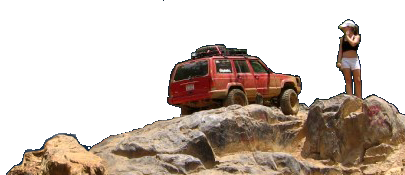Recovery gear is a wide spread area. You could venture as far as safety stuff like fire extinguishers, wheel chocks, etc etc. It really depends on your budget, but here are some items/explanations etc:
Bare Minimum:
1x Tow Strap, with loop ends: Hooks can be dangerous of course, so most opt for a strap with loop ends. You can get the run of the mill strap 20' or 30' from Wal-Mart. Or you can go for a little bit more $$4 and get a brand name strap that is a little bit more heavy duty.
Recommended:
Gloves: Especially if you will be using a winch these come in handy.
1x Tow Strap, with Loop Ends: Covered Above
1x Tow Strap, with hook ends: There are jobs and situations that call for hooks. Especially when the vehicle doesn't have the greatest recovery points. Its always a must to have one, and again they sell them at Wal-Mart
Jack: A high lift jack is preferred but any kind of jack can be adapted for recovery. A floor jack and a piece of wood to spread the weight can even be used.
Shovel/Pick Tool: At Uwharrie this may not be as prudent because of the hard packed clay, but anywhere there is soft mud this is essential. Get a flat tire or stuck in the mud and you will wish you had one.
Above and Beyond (Winches etc included):
D-Ring: I would put this in the recommended but usually people have these on their bumper anyway. Even if you don't have a "d-ring" attachment spot on your bumper, it can help attach straps in other situations.
Snatch Strap: Think of a rubber band to put it very simply. It helps greatly in recovery if you are planning to wheel in the deep gooey stuff.
Snatch Blocks/Tree Savers etc: If you don't have a winch these are not as common. But if you do have a winch these are key items to have.
Come-a-long: I thought about putting this in the recommended but its a tiny bit beyond that. Again if you wheel alone, or where you might not be able to get a vehicle/strap this is a must. It also helps in loading disabled vehicles onto trailers.

